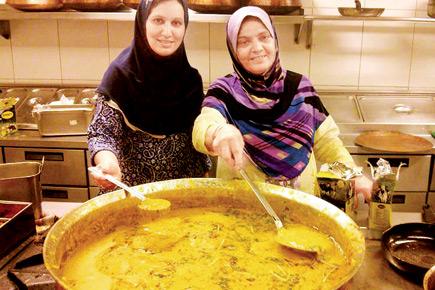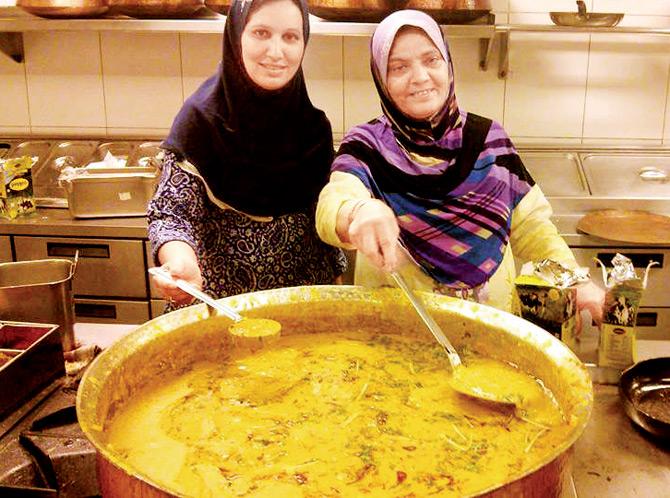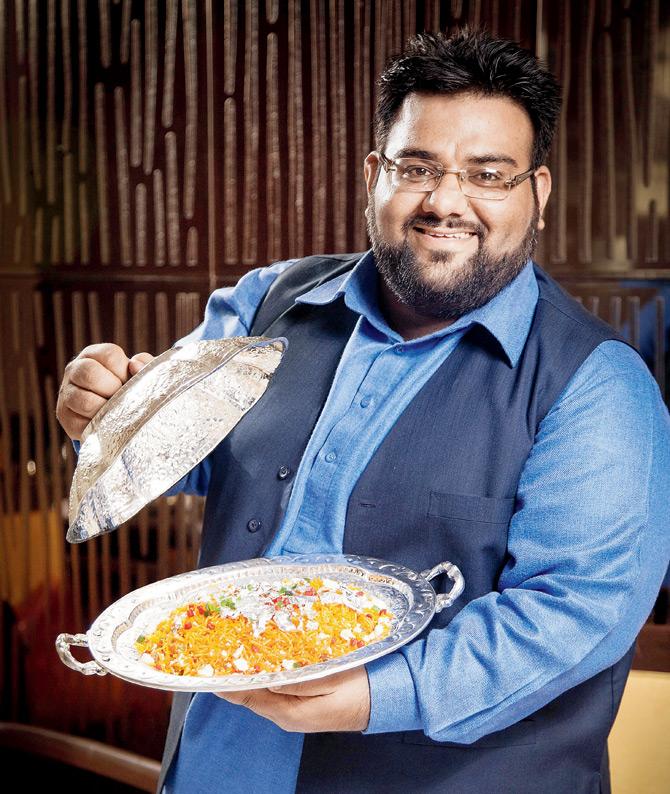On a visit to the Mumbai, food curator Osama Jalali teams with his ammi to recreate Mughlai food of the khansamas

Osama Jalali's wife Nazia and mother Naizish
The menu of Rivaayat-e-Dilli, an ongoing fest at Maya, Trident, resembles an ancient royal scroll.
It’s curator, Osama Jalali, stops at the table but is unregnisable. He is nothing like his Facebook pictures; he has lost 37 kg in four months. The popular Delhi-based food writer once weighed 140 kg. "I couldn't walk 200 metres at a go," he says.
ADVERTISEMENT

Osama Jalali's wife Nazia and mother Naizish
We seek a few minutes from the 32-year-old. "No hurry,” he says. “I am not the chef. My mother, Nazish Jalali and wife, Nazia Khan, are in charge of the kitchen."
Osama’s mother hails from Rampur, a town in Uttar Pradesh, where the khansamas of nawab kitchens were her tutor. She moved to Delhi when she married Najam Jalali, a doctor. His clinic stood opposite Kareem, Delhi’s famed kebab joint, and its khansamas and their families were his patients. “When a patient recovers, he usually brings sweets for the doctor. The khansamas brought us korma," he says.

"Intrigued by what she ate, Naizish would inquire with them for recipes, which they guarded with life. But because a doctor is akin to God, they readily share them with ‘Doctorsaab’s wife’.
The Jalali home saw frequent dawats thanks to the circle his grandfather, a mutfi at Jama Masjid, roamed.
Osama’s interest in food was founded early. As a seven-year-old visiting Rampur from Delhi, he hang at the tandoor section where bawarchis made rotis. “I’d wonder ki itni badi roti zameen ke gadde se kaise nikalti hai. For the biryani, the rice was spread on a muslin cloth on a charpoy. This process is called pasana," says Osama. Three years ago, when his father passed away, his mother was distraught and spent most of time reading the Quran. "Around the same time, a five-star in Delhi wanted to organise a festival called Shajahanabaad ki ser. Since I’d made a name as food writer, friends from the industry and bloggers turned up for the tasting which ammi worked tirelessly on with me. It was a risk; I was now on the other side of the fence," he laughs.
The festival was a hit, and Jalali joined hands with blogger Chowder Singh to hold his first food walk around Delhi during Ramazan.
What sets their spread apart, he argues, is home-style of preparations. "Usually, Delhi food festivals feature street food. In our dishes, we offer more vegetarian options, meats and vegetables are cooked together, and even daal-meat combos."
An executive chef at The Oberoi in Delhi was on the walk, and that led to Osama collaborating on Rivaayat, a workshop on lost recipes. The hotel’s chefs received hands-on training during the workshop where Osama shared the tricks of ancient cooking methods. Eventually, he hosted his own fest at the hotel, Rivaayat-e-Rampur.
The event saw no less than the Nawab of Rampur himself. “I wont forget his reaction to the meal. He said, ‘When I close my eyes, I feel like I am eating at a vali (wedding) in Rampur.’ It was an emotional moment for ammi, who as a kid, had accompanied her khala (aunt) to see the entourage of the queen and prince during an election rally,” says Osama.
The advent of molecular gastronomy pushed Osama back a few dacdes. “If I show my six-year-old daughter chutney made on Sil Bhatti, she will say, where is the foam? I started researching lost recipes and launched the Facebook group, Lost Recipes of India. Within three months, it had 12,000 members.”
From the data pool they gathered, Osama held the Lost Recipes of the Moghuls fest. His wife dug out Persian recipes which she got translated into Urdu, and they whittled it down to a final set of 15 dishes.
It’s time to taste the Jalali flavours. When we share that one of us in the group is vegetarian, he promptly says, "Koi baat nahin; Aurangzeb bhi vegetarian tha."
Mewa mawa tikki, Kathil (jackfruit) ki galouti, Nihari, Hari mirch kheema, Murg korma, Channe ki daal ka bharta and Khamiri roti are laid out.
Executive chef, Trident, BKC, Ashish Bhasin joins in to bring up Parinde me parinda. That’s duck stuffed with chicken stuffed with quail stuffed with eggs and dry fruit! "Originally, the dish had 12 elements, starting with a camel," Osama says with a straight face.
Since the Moghul empire was spread vast, the cooking technique changed every hundreds of kilometers. “In purani Dilli, there is a hotel called Rehamatullah. Under the Urdu name it is written also in Bengali script.
Because of the influx of Bangladeshi labour around the Jama Masjid. The food has changed over the years. Tomatoes are now added to the nihari, the spice levels have shot up and ghee is used more liberally. Gosht ka taste dab gaya hai. Nihari is actually a lashkari dish, made to keep the Army energised for war,” says Osama, whose nihari is sans tomato, cooked in light gravy and fall-of-the-bone meat.
”The Mughals came to India from Samarkand of Mongol, inhabited by dacoits, who followed the hide and fight technique. They were small platoons fighting against massive armies. They would leave home with their bows and arrows, and a supply of marinated meat. At meal time, they’d dig a pound in the earth, place the meat in and cook. That's how we got the tandoor. When it was too cold to settle in Russia, they came to India via Samarkand, Persia, Iran and finally Afghanistan. That’s why you see the similarity in the cuisine of all these areas,” says Bhasin.
 Subscribe today by clicking the link and stay updated with the latest news!" Click here!
Subscribe today by clicking the link and stay updated with the latest news!" Click here!








